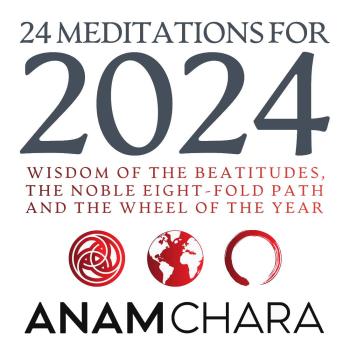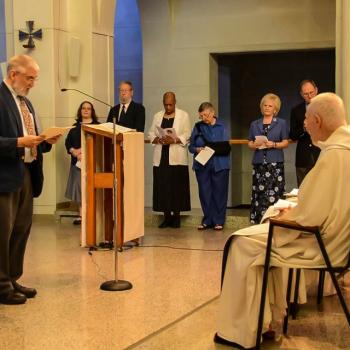
A couple of years ago Rob Bell wrote a book with the title What We Talk About When We Talk About God. I haven’t read the book, but I love the title. So I suppose this blog post could be called “What we talk about when we talk about contemplation.”
If that seems funny to you, I admit I’m being ironic. Why talk about something that takes us — or at least invites us — to a place beyond language, beyond words, beyond grammar? But as silent as contemplation is, the reality of being human is that we love to talk about, well, everything. We talk about God. We talk about love. We talk about mystery. And yes, we talk about contemplation.
So for today’s post (and next Wednesday’s as well), I’m sharing with you two sets of six quotations, both from sacred scripture and from other writings that I have found useful, that function as a set of “guiding principles” that help me to remain focused on my understanding of contemplation. It’s a total of twelve quotations: six today, and six next week.
I hope you will read over these quotations, and reflect on their meaning, and how they can provide us with a kind of trellis on which we can hang our understanding of this deeply silent way of beholding God and all things. Yes, I know it’s a paradox, and I know that the best way to understand contemplation is simply to do it (which means being silent rather than chattering on about it).
Nevertheless, since it is human nature to think, and to reflect on what gives life meaning, I hope you will reflect on these principles. Just don’t do it until after you’ve spent some time in silence.
- Silence is praise. (Psalm 65:1 translated literally)Contemplation is not a practice or a technique; it is a way of seeing, of listening and of paying attention, that is grounded in silence. Silence is more than just the absence of sound, it is the presence of the open present moment, where we make ourselves available to attend to God. This attentiveness is an actual form of praise, of worship.
- Know the love of Christ that surpasses knowledge, so that you may be filled with all the fullness of God. (Ephesians 3:19)Contemplation begins in love and takes us beyond thought or knowledge, leading us to that place where we recognize God’s presence in our lives, empowering us to love God and one another, to find meaning in suffering, and to remain grounded in hope and joy.
- The Christian of the future will be a mystic or will not exist. (Karl Rahner)We are all called to contemplation. Silent prayer is not just for nuns or monks, priests or ministers, saints or visionaries. It’s for all of us. Christianity is in crisis today at least in part because the church has abandoned its contemplative heritage. It is vital that we reclaim that heritage for ourselves and for the future.
- Contemplation is the only ultimate answer to the unreal and insane world that our financial systems and our advertising culture and our chaotic and unexamined emotions encourage us to inhabit. (Archbishop Rowan Williams)Contemplative living provides an alternative to the forces in life that foster consumerism, materialism, low self-worth, and environmental degradation. Contemplation helps us to create a happier, healthier life. It is a spiritual discipline, but even more than that: it is a way of putting our faith into action, with practical, and even social, ramifications.
- Contemplatives explore the waste of their own being. It is in the midst of chaos and crisis that they pursue the vision of God and experience the conflict which is at the core of the contemplative search. (Kenneth Leech)Contemplation is not an escape from the messiness of life. Rather, it is a fearless entry into life’s “chaos and crisis” so that we might foster healing, renewal, and wellness for our selves, our relationships, and our world.
- Contemplative practice is not a technique but a surrendering of deeply imbedded resistances that allows the sacred within gradually to reveal itself as a simple, fundamental fact. (Martin Laird)What Orthodox Christianity calls theosis is the summit of the spiritual life: the recognition that “God and I are not two” and that our destiny as children of God is nothing less than union with God.
Do these principles resonate with you? Please let me know: leave a comment here, or on social media. And be sure to click here for my other six principles of contemplative spirituality.
Enjoy reading this blog?
Click here to become a patron.














